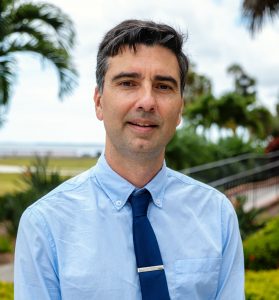At the Crossroads of Mind and Myth: A Conversation with Professor Manuel Lopez, Ph.D.

Manuel Lopez, Ph.D. is a scholar of Buddhism with a focus on the traditions of Tibet and other Himalayan regions. He teaches courses on Tibetan Buddhism, Buddhist contemplative systems, Hinduism and Asian religions as an associate professor of religion at New College.
Lopez’s path to this knowledge began during his undergraduate studies at the Universitat Pompeu Fabra in Barcelona, Spain. It continued with his post-graduate and doctoral studies at the University of Virginia, where Jeffrey Hopkins (the acclaimed Tibetan Buddhist scholar and translator of many of the Dalai Lama’s Sanskrit writings) was one of his professors. As a result of this intense study, Lopez mastered a demanding specialty, but he never let it become a limitation.
He is also interested in the role that religion has played in human culture throughout history, as well as in contemporary popular culture. He loves taking his New College students to the crossroads where mind and myth come together. After that, he lets them find their own path.
What is your favorite thing about being a New College faculty member?
I’d say it’s the freedom on the part of the faculty to teach whatever they want, and the freedom on the part of the students to take charge of their education and choose their own educational path. That’s one thing that initially attracted me to New College. I had previously taught an “Introduction to World Religions” course at a large state college. With a few exceptions, my students took the course because it was a requirement. At New College, the students all want to be in my classroom. They don’t have to take my classes. For them, it’s entirely a matter of choice. As a result, they’re just so much more passionate. That’s something I deeply enjoy about the New College experience.
As a teacher, what are some of your key lessons?
I try to open my students to very different worlds. As human beings, we all share many commonalities. I teach my students that our differences are just as important. American culture is so dominant. It’s easy to forget that other cultures don’t always think as we do.
What originally drew you to the study of Tibetan Buddhism?
I grew up in a very traditional Catholic household. My childhood faith didn’t have all the answers for me. Buddhism had answers to questions I never thought to ask. On a very basic level, it had very different concepts—or really, deconstructions—of self, reality and consciousness. I found that to be so fascinating and continued to pursue it.
What do you hope your students will take away from your classes?
Some students have gone on to further religious studies, but that’s not really my goal. When I looked back at my own college notebooks and papers, I noticed something interesting. I’d study one thing, then jump to something else. Medieval history led to this, led to that, and I was ultimately drawn to Asia, China, Tibet and my current field of study. I followed my curiosity and ultimately found my own path. I wish the same thing for my New College students. After taking one of my classes, I want my students to add my lessons to their intellectual backpacks. I hope it will nurture something important within them, and remain with them on their journeys through life.
To read the entire Fall 2021 issue of Nimbus, visit issuu.com/newcol/docs/newcollege_nimbus89-fall_f_121521.
Su Byron is the communications specialist for the New College Foundation.
